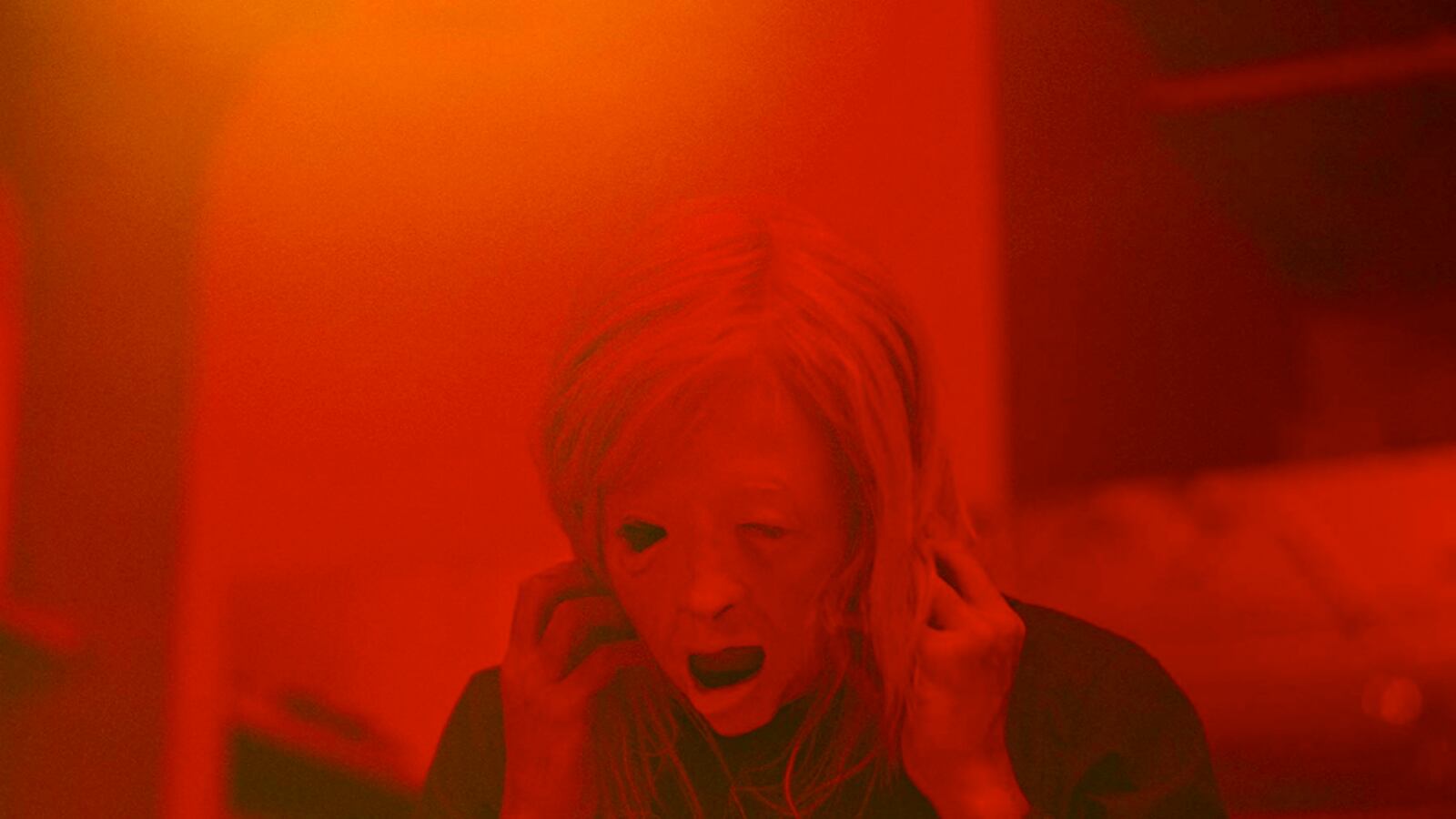Heir to cinema’s body-horror throne, writer/director Brandon Cronenberg triumphantly follows in dad David’s footsteps with Possessor, a grandly gruesome sci-fi nightmare that traces the blurry line between the psychological and the corporeal, the real and the imagined, and the authentic and the affected. Coming on the heels of his prior 2012 Antiviral, it heralds Cronenberg as a formidable talent in his own right, marking him as an expert purveyor of schizoid violence and madness engineered to parasitically crawl under one’s skin.
There’s plenty lurking beneath the surface in Possessor (premiering at select theaters and drive-ins on October 2, with a VOD debut to follow), most of it cold, twisted and ruthless. In an unspecified future, Tasya Vos (Andrea Riseborough) works as a hired killer for a mysterious corporate firm. Taking orders from boss Girder (Jennifer Jason Leigh), Tasya carries out her assignments in novel fashion: through a futuristic process in which she lays down on a surgical table and has her face connected to a face hugger-esque contraption, she can infiltrate the minds of other people, whom she then manipulates with the aid of a needle-like cranium implant. It’s assassination via techno-possession, and in an introductory scene in which she operates nightclub hostess Holly (Gabrielle Graham) like a puppet in order to stab a lawyer to death, it works like a charm.
Tasya is a ghost in the human machine, and she escapes her unique predicament by demanding extraction at the moment she forces her vessel to commit suicide. Afterwards, she’s asked by Girder to identify objects from her personal life as a means of proving that she’s severed her co-opt connection, and returned to normal. The nature of the self, however, is a slippery issue in Possessor, since no sooner has Tasya exited Holly than she’s visiting her own estranged husband Michael (Rossif Sutherland) and son Ira (Gage Graham-Arbuthnot). Before she drops in on them, Tasya diligently rehearses the lines she plans to use to greet them—an act that implies she’s less than content in her own skin, and with her traditional role as a mother and a wife.
In every respect, Possessor is a self-consciously sinister film about performance—and the effects it has on individuals’ conception of identity—and the next part Tasya is asked to play by her employer is that of Colin Tate (Christopher Abbott), the boyfriend of Ava Parse (Tuppence Middleton), first in line to inherit her father John Parse’s (Sean Bean) data-mining firm. Hired by Ava’s brother, who wants the family fortune to himself, Tasya is tasked with framing Colin for John and Ava’s murders, which she’s supposed to carry out at the conclusion of a gala party. Before that can be accomplished, though, Tasya must first create a convincing “narrative” by sowing seeds of doubt about Colin’s stability. Thus, in the days leading up to the crime, she has Colin behave in a slightly uncharacteristic manner around Ava, as well as at his job, where he catalogs specific information about curtains that are featured in the many video feeds that John Parse’s company acquires by spying on people through their computer cameras.
Invasive penetration is omnipresent in Possessor. Upon seizing command of Colin, Tasya’s mind becomes plagued by visions of stabbing her prior target in the neck. Cronenberg laces his action with psychosexual imagery of phallic weapons piercing pliable flesh, resulting in torrents of gushing fluids. Collaborating with cinematographer Karim Hussain, the director visualizes the possession process as a fragmented eruption of disorienting lights, plummets down esophagi, and melting and reconstructing faces and hands, with those hallucinatory visuals wedded to Jim Williams’ jarring, menacing electronic score. By the time Tasya, as Colin, is “seeing” herself as a female body with an erect penis while having sex with Ava, the boundaries between the interior and the exterior have gone hopelessly fuzzy, much to the chagrin of Tasya, who’s trying to maintain stewardship of her host (and her sanity) long enough to complete her mission.
Control, alas, is elusive in Possessor, and Tasya is soon ceding the proverbial wheel—against her wishes—to a thoroughly-freaked-out Colin, highlighted by an unforgettable sequence in which the latter (figuratively) crushes the former’s face like a pumpkin, dons her droopy-mouthed dead skin mask, and traverses her thoughts and memories. Populating his frame with mirrors that suggest the doubled (and ever-shifting) status of Tasya and Colin’s conjoined predicament, and providing rotating views of reflective skyscrapers to enhance the sense that the universe has become unmoored from its bearings, Cronenberg stages his hallucinatory material as a descent into altered states. His is a topsy-turvy world of voyeurism, amalgamation and violation; of conjoined realities competing for domination; and of techno-organic symbiosis (facilitated by devices full of old-school cables and dials) functioning as a vehicle for brutality, self-discovery, and escape.
From its austere and forbidding environments (often drenched in dreamy color-filter hues), to its sexualized carnage—such as a fire poker to the mouth—and its splintered sights of close-up eyes and interfused faces tearing apart from each other, everything is unreal and unnatural here. With a gaunt, troubled visage, Riseborough comes across as both a cold-blooded invader and a hollow shell of a woman, caught between domestic obligation and her deeper, darker desire for autonomy. Her Tasya is a figure striving for actualization and reconciliation in the most unconventional way possible, and Riseborough’s mesmerizing turn is melded to that of the impressive Abbott, who during the film’s second half is asked to simultaneously embody, and express, two intertwined characters—a scenario that keeps his performance, and the proceedings, excitingly restless.
Ultimately, though, Possessor is Cronenberg’s show, and he orchestrates it with demented and dynamic flair. The director’s aesthetics exude volatile, venomous energy, creating the notion that this universe would go flying off its axis at the slightest nudge—or that its inhabitants’ brains might explode, Scanners-style, at a moment’s notice. Refracting many of his father’s thematic and narrative preoccupations into something strange and surreal and mind-fryingly new, he delivers creepy genre thrills while also painting an unnerving meta portrait of self-definition as a performative act. The result is a movie hardwired to horrify.


